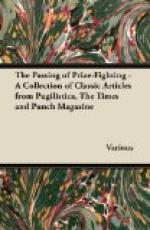* * * * *
Open the Door won the two hundred and fifty pounds prize offered by Messrs. MELROSE, and without troubling to inquire into the merits of its rivals I wholeheartedly commend the award. For some curious reason its length (one hundred and eighty thousand words—no less) is insisted upon by the publishers, but as a matter of fact Miss CATHERINE CARSWELL’S novel would have been even more remarkable if it had been of a less generous bulk. Her style is beyond reproach and she has nothing whatever to learn in the mysteries of a woman’s heart. The principal scenes are placed in Glasgow, and the Bannermann family are laid stark before us. Mrs. Bannermann was so intent on the next world that for all practical purposes she was useless in this. Having been left a widow with two sons and two daughters, she was incapable of managing the easiest of them, let alone such an emotional complexity as Joanna. It is upon Joanna that Miss CARSWELL has concentrated her forces; but she is not less happy in her analysis of the many lovers who fell into the net of this seductive young woman. Indeed I have not for many a day read a novel of which the psychology seemed to me to be so thoroughly sound.
* * * * *
I hope “Miss M.E. FRANCIS” will take it as a compliment when I say that Beck of Beckford (ALLEN AND UNWIN) should form part of the holiday equipment of all of us whose brows are not too exalted to enjoy it. In her unostentatious way Miss FRANCIS knows how to provide ample entertainment, and she has nothing to learn in point of form. When we are introduced to the Becks they are proud and poor, having impoverished themselves in the process of removing a blot from their escutcheon. Sir John is a working farmer, and Lady Beck does menial duties with an energy that most servants of to-day would not care to imitate. The apple of their old eyes is their grandson, Roger, and the story turns on his struggle between pride and love. No true Franciscan need be told that he comes through his struggle, with flying colours. So quietly and easily does the tale run that one is apt to overlook the art with which it is told. But the art is there all the time.
* * * * *
[Illustration: Countrywoman (her first glimpse of the sea). “AIN’T IT ASTONISHIN’, WILLIUM? WHO’D ’AVE THOUGHT THEER COULD BE AS MUCH WATER AS THAT?”
Willium. “YES; AN’ REMEMBER, MARIA, YE ONLY SEE WHAT’S ON TOP.”]
* * * * *
“You can greet an acquaintance
while you are cycling by smiling and
nodding your head or by waving.
Which you do depends on the depth of
your acquaintanceship.”—Home
Notes.
And not, as you might think, on your proficiency as a cyclist.



